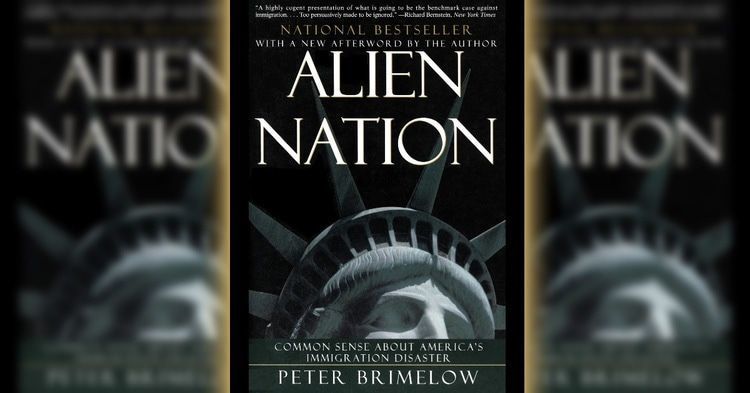
Alien Nation Review: Embers Under The Melting Pot, By Stuart Anderson
05/13/1995
The Washington Times, May 13, 1995, Page C3
By Stuart Anderson
The United States is like a rickety lifeboat, its culture is fragile, the American nation will be "snuffed out," and the nation-state itself may not survive. These are the premises upon which Peter Brimelow’s "Alien Nation" is based.
I recommend that anyone interested in immigration read "Alien Nation." Mr. Brimelow writes well, and he marshals his material like a streetwise attorney looking to rouse a jury. To argue his case, he unleashes everything from pathos to patriotism.
Readers should be aware, however, that research widely available from other sources arrives at quite different conclusions from Mr. Brimelow’s. These other sources contradict his arguments that immigrants increase unemployment, that working-age, non-refugee immigrants use welfare more than native-born Americans and that the United States is now attracting a lower-quality immigrant when measured by educational level.
The primary weakness of "Alien Nation" is that it is ahistorical. Various doomsayers from each of the last three centuries are cited in the book to demonstrate the dangers of immigration. Yet it is never adequately explained, if America has flourished during this time and each generation’s prophets of doom have been proven wrong, why we should expect this generation’s prophets to be proven right.
Mr. Brimelow also seems to overlook that the act of immigrating is itself enterprising. As Thomas Sowell writes in "Ethnic America," "The fact that immigrants not only equal but eventually surpass their native-born counterparts [of the same race or ethnicity] suggests that they brought some advantage in terms of human capital, that migration is a selective process, bringing the more ambitious or venturesome or able elements of a population."
Assimilation, particularly the nearly complete assimilation of immigrants' children, is not widely discussed in "Alien Nation," except to warn that bilingual education makes it more difficult. But race and population growth are the main issues that drive Mr. Brimelow. So even if one eliminated bilingual education, as well as welfare, affirmative action and multiculturalism, one would not expect him to change his mind.
On the issue of U.S. population growth, Mr. Brimelow writes, "The U.S. population would still be at about half its current level if there had been no immigration at all after 1790." It is not clear that a far smaller nation would have defeated Nazi Germany, won the Cold War or built up such a dynamic economy.
Mr. Brimelow actually recommends that the U.S. government establish a national racial policy. His arguments are driven by a U.S. Census estimate that in 2050 whites will make up 53 percent of the population. Mr. Brimelow writes: "It is simply common sense that Americans have a legitimate interest in their country’s racial balance. It is common sense that they have a right to insist that their government stop shifting it. Indeed, it seems to me that they have a right to insist that it be shifted back."
It is not at all clear why any individual has an interest in a society’s racial composition 55 years from now. And even though today’s immigrants intermarry at far higher rates than earlier immigrants, Mr. Brimelow warns: "Intermarriage cannot guarantee social harmony. That can be done only by an American majority that is confident and strong." It is clear that Mr. Brimelow defines "Americans" and "an American majority" as white people.
Mr. Brimelow recognizes that America and its melting pot are unique. "Let’s be clear about this: The American experience with immigration has been a triumphant success. It has so far transcended anything seen in Europe as to make the application of European lessons an exercise to be performed with care." It might be asked then: Why tamper with such success?
Whether one accepts the premise of "Alien Nation" depends greatly on how one views America. If one believes this is a country whose best days are behind it, that it is a dying empire with a crumbling culture and that it must bar the door to preserve scarce resources and block outside influences, then this book will likely strike a chord.
Yet if one believes that America’s future is bright, that our economy and social system are aided by dynamism and that this remains the greatest cultural, political, economic and military power in the history of the world, then "Alien Nation" will provoke only wonder at how such a beautiful bastion of freedom could breed such unwarranted pessimism.
Stuart Anderson is policy director of the Alexis de Tocqueville Institution in Arlington.
